Acepromazine is a prescription sedative and tranquilizer commonly used in dogs to provide mild, long-lasting sedation. It’s often administered as a pre-anesthetic agent or for anxiety relief.
What is Acepromazine?
Acepromazine is a prescription sedative and tranquilizer used in veterinary medicine to provide mild, long-lasting sedation in dogs. It is classified as a phenothiazine derivative and is commonly administered to reduce anxiety, stress, or excitement. Acepromazine is also frequently used as a pre-anesthetic agent to calm dogs before surgical procedures or veterinary examinations.
Common Uses in Veterinary Medicine
Acepromazine is widely used in veterinary medicine as a sedative and tranquilizer to calm anxious or stressed dogs. It is often administered to reduce anxiety during travel, loud noises, or vet visits. Additionally, acepromazine is commonly used as a pre-anesthetic agent to relax dogs before surgical procedures, ensuring smoother anesthesia and recovery. Its long-acting effects make it ideal for prolonged sedation needs.
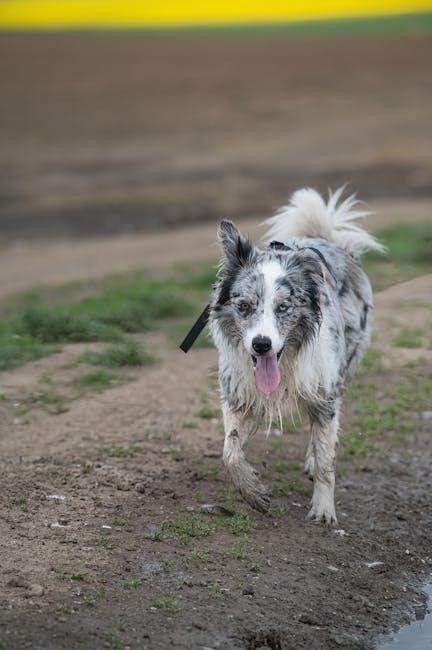
Dosage Guidelines for Acepromazine in Dogs
Veterinarians recommend acepromazine doses of 0.5 to 1.5 mg per pound or 1 to 3 mg/kg for dogs. Always consult a vet for precise dosing.
General Dosage Recommendations
The standard dosage of acepromazine for dogs is typically between 0.5 to 1.5 mg per pound of body weight, or 1 to 3 mg per kilogram. This range ensures mild to moderate sedation. The medication is often administered orally or via injection, depending on the situation. Always follow a veterinarian’s guidance for accurate dosing.
Factors Affecting Dosage
Acepromazine dosage varies based on the dog’s weight, age, health status, and the purpose of sedation. Smaller or older dogs may require lower doses, while larger breeds need higher amounts. Pre-existing medical conditions, such as liver or kidney issues, also influence the prescribed dosage to ensure safety and effectiveness.
How to Administer Acepromazine Safely
Acepromazine should be administered orally, following the prescribed dosage by weight. It can be given with or without food to prevent stomach upset. Always follow your veterinarian’s instructions and monitor your dog’s behavior and health status before and after administration. Adjustments may be needed based on age, health conditions, or individual tolerance.
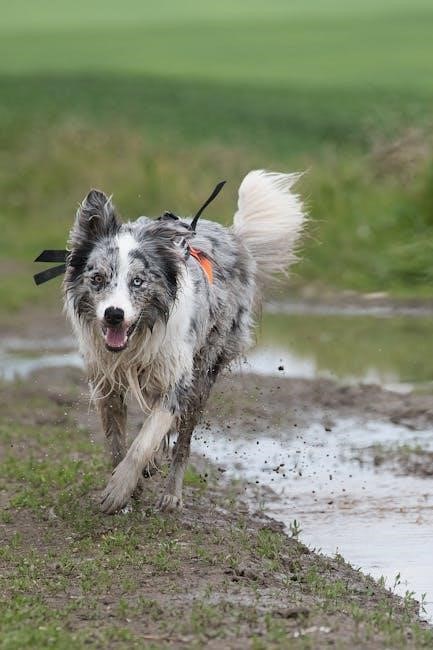
Calculating Acepromazine Dosage by Weight
Dosage is typically 0.5-1.5 mg per pound or 1-3 mg/kg of body weight. Always consult a veterinarian to determine the precise dose for your dog based on their weight, age, and health status.
Dosage Per Pound
The standard dosage of Acepromazine for dogs is typically 0.5 to 1.5 mg per pound of body weight. This range ensures safe and effective sedation, with adjustments based on the dog’s health, age, and purpose of administration, such as sedation or pre-anesthesia. Always consult a veterinarian to confirm the appropriate dose for your dog.
Dosage Per Kilogram
The recommended dosage of Acepromazine for dogs is typically 1 to 3 mg per kilogram of body weight. This range ensures safe and effective sedation, with adjustments based on the dog’s health, age, and purpose of administration, such as sedation or pre-anesthesia. Always consult a veterinarian to confirm the appropriate dose for your dog.
Practical Examples for Different Weights
For a 10kg dog, the dosage ranges from 1-3mg, while a 20kg dog requires 2-6mg. A 30kg dog needs 3-9mg, and a 40kg dog requires 4-12mg. These examples provide a clear guide for administering Acepromazine safely, ensuring the dose aligns with the dog’s weight for optimal effectiveness and minimal risk of adverse effects. Always consult a veterinarian for precise instructions.

Safety and Precautions
Acepromazine is a prescription medication requiring veterinary guidance. Avoid over-administration, as it can harm liver and kidney function. Monitor for adverse effects like prolonged sedation or low blood pressure.
Maximum Safe Dosage
The maximum safe dosage of acepromazine for dogs is typically 1.5 mg per pound or 3 mg per kilogram. Exceeding this can lead to adverse effects such as prolonged sedation, hypotension, or organ strain. Always adhere to veterinary recommendations to ensure your dog’s safety and avoid potential health risks.
Risks of Overdose
Overdosing acepromazine can cause severe sedation, low blood pressure, and impaired organ function. Symptoms may include extreme lethargy, vomiting, or respiratory distress. In severe cases, it can lead to coma or organ failure. Immediate veterinary care is crucial if an overdose is suspected to prevent life-threatening complications.
Signs of Adverse Reactions
Common signs of adverse reactions to acepromazine include excessive drooling, pale gums, and unsteadiness. Severe reactions may involve seizures, difficulty breathing, or collapse. Monitoring your dog for these symptoms is crucial, as they can indicate an allergic response or overdose, requiring immediate veterinary intervention to ensure your dog’s safety and well-being.
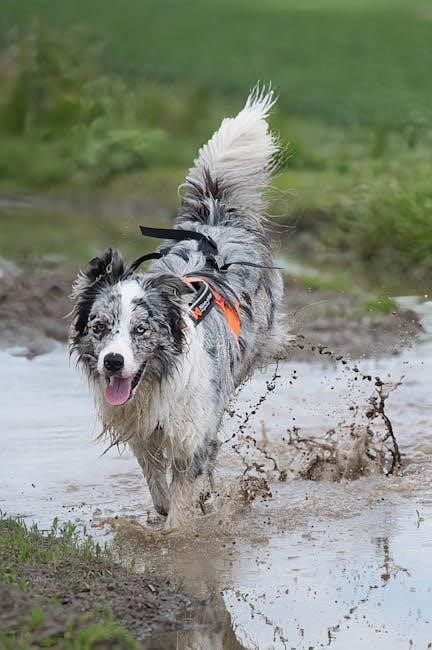
Using Acepromazine as a Pre-Anesthetic Agent
Acepromazine is frequently used as a pre-anesthetic agent in dogs to reduce anxiety and stress before surgery. It helps calm the dog, making the anesthesia process safer and more effective. Veterinarians often administer it to ensure a smoother procedure and faster recovery for the animal.
Benefits of Pre-Anesthetic Sedation
Pre-anesthetic sedation with acepromazine reduces anxiety and stress in dogs, creating a calm state before surgery. It minimizes the risk of complications, lowers the required anesthesia dose, and ensures a smoother, safer procedure. This approach also helps in reducing post-operative recovery time and stress-related behaviors, promoting overall well-being for the dog.
Effects on Anesthesia
Acepromazine enhances the effectiveness of anesthesia by reducing the required dose of anesthetic agents. It stabilizes vital signs, such as heart rate and blood pressure, during surgery. This results in a more controlled and predictable anesthetic experience, improving safety and reducing potential risks associated with anesthesia in dogs.
Veterinary Guidance for Pre-Anesthetic Use
Veterinarians recommend administering acepromazine 1-2 hours before anesthesia to ensure optimal sedation. The typical dosage ranges from 0.5 to 1.5 mg per pound (1 to 3 mg/kg), tailored to the dog’s size, age, and health status. Proper timing and dosage help minimize risks and ensure a smooth anesthetic procedure.
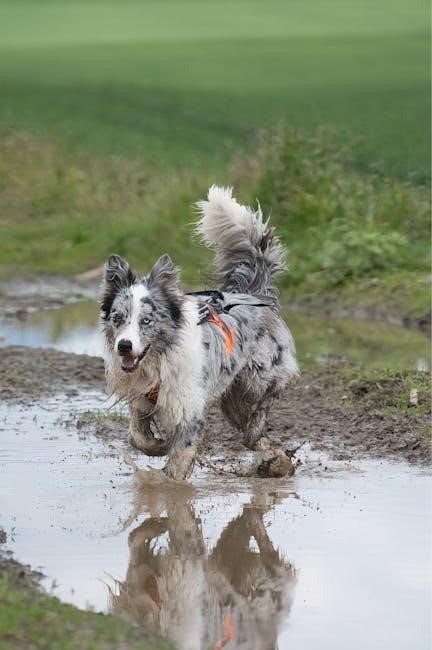
Side Effects and Adverse Reactions
Acepromazine can cause mild side effects like low blood pressure and dry mouth. Severe reactions, such as prolonged sedation or liver/kidney issues, may occur with improper use.

Common Side Effects
Acepromazine commonly causes mild sedation, low blood pressure, and dry mouth. Drowsiness and reduced activity levels are also frequent. These effects are generally temporary and not dangerous.
Severe Reactions to Watch For
Severe reactions to acepromazine are rare but may include excessive vomiting, trembling, or pale gums. In extreme cases, it can cause low blood pressure, respiratory distress, or unresponsiveness. If your dog experiences these symptoms, seek immediate veterinary care to prevent complications.
When to Seek Veterinary Help
Severe reactions to acepromazine, such as excessive vomiting, trembling, pale gums, or difficulty breathing, require immediate veterinary attention. If your dog experiences prolonged sedation, unresponsiveness, or unexpected behavior, consult your vet promptly. If symptoms persist beyond 24 hours or worsen, seek professional advice before administering another dose. Overdosing can harm vital organs, so monitoring is crucial.
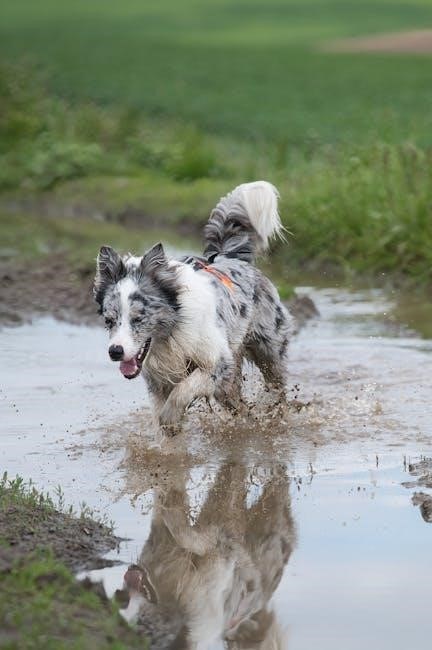
Contraindications and Special Considerations
Acepromazine is not recommended for dogs with severe liver or kidney disease, as it can worsen these conditions; Caution is advised for puppies and certain breeds.
Conditions Where Acepromazine is Not Recommended
Acepromazine is contraindicated in dogs with severe liver or kidney disease, as it can exacerbate these conditions. It should also be avoided in dogs with a history of low blood pressure, heart conditions, or respiratory issues. Additionally, it is not recommended for dogs with known allergies to phenothiazines or those in a debilitated state.
Interactions with Other Medications
Acepromazine can interact with other medications, such as anesthetics, antidepressants, and antihistamines, potentially enhancing sedative effects. Concurrent use with barbiturates or SSRIs may increase the risk of adverse reactions. Always inform your veterinarian of any medications your dog is taking to ensure safe administration and avoid dangerous drug interactions.
Age and Health Status Considerations
Puppies and elderly dogs may require adjusted dosages due to increased sensitivity. Dogs with liver or kidney disease should be closely monitored, as acepromazine is metabolized by these organs. Consult your veterinarian to ensure safe administration, especially for dogs with pre-existing health conditions or those taking other medications.

Duration of Effects and Monitoring
Acepromazine typically lasts 6-12 hours in dogs, depending on metabolism and health status. Monitor your dog for prolonged sedation or adverse reactions during this period.
How Long Does Acepromazine Last?
Acepromazine effects typically last 6-12 hours, with sedation starting within 1 hour and peaking around 2-4 hours. The duration varies based on metabolism, health, and dosage. Monitor your dog for prolonged sedation or unexpected effects, as some dogs may experience lingering drowsiness up to 24 hours after administration.
Monitoring Your Dog After Administration

After giving Acepromazine, monitor your dog for signs of adverse reactions, such as vomiting, pale gums, or excessive drooling. Ensure they remain calm and comfortable in a quiet environment. Watch for prolonged sedation or unusual behavior. If severe symptoms arise, consult your veterinarian promptly to ensure your dog’s safety and well-being.
Factors Influencing Duration of Effects
The duration of Acepromazine’s effects can vary based on factors like weight, metabolism, age, and overall health. Higher doses may prolong sedation, while smaller dogs may experience shorter effects. Additionally, individual tolerance and whether the drug was administered with food can influence how long the sedative effects last in your dog.
Always consult a veterinarian for accurate Acepromazine dosing and to ensure your dog’s safety. Responsible use and adherence to guidelines are crucial for effective sedation without adverse effects.
Key Takeaways for Dog Owners
For dog owners, understanding proper Acepromazine dosage by weight is crucial. It’s essential to follow veterinary guidelines to avoid overdose risks and ensure safety. Always calculate doses based on your dog’s weight and health status. Monitoring your dog’s behavior post-administration is vital to address any adverse reactions promptly. Consult your vet for personalized advice to ensure your dog’s well-being. Remember, responsible use and adherence to professional recommendations are key to effective and safe sedation. By being informed and proactive, you can help your dog receive the best care possible when Acepromazine is prescribed. Stay informed and always prioritize your dog’s health above all else.
Importance of Veterinary Consultation
Veterinary consultation is crucial when using Acepromazine. A vet ensures proper dosage based on your dog’s weight, health, and specific needs. They can assess potential risks and interactions with other medications. Consulting a vet prevents overdose and ensures safe use, tailored to your dog’s unique conditions. Always seek professional advice for accurate guidance and peace of mind. This ensures your dog’s safety and well-being, avoiding adverse reactions and complications. Regular check-ups and open communication with your vet are essential for responsible medication administration. By involving a professional, you guarantee the best outcome for your dog’s health and safety. This collaborative approach ensures optimal care and minimizes risks associated with Acepromazine use. Your vet’s expertise is invaluable in safeguarding your dog’s well-being. Always prioritize professional consultation for any medication, especially sedatives like Acepromazine. This ensures your dog receives the correct treatment and avoids potential harm. Veterinary guidance is the cornerstone of safe and effective Acepromazine administration. Consult your vet before any dosage adjustments or administration. Their advice is tailored to your dog’s specific needs, ensuring safety and efficacy; This personalized approach guarantees your dog’s health remains a top priority. By consulting a vet, you make informed decisions that benefit your dog’s overall well-being. Always rely on professional expertise for accurate and reliable guidance on Acepromazine use. This ensures your dog’s safety and the effectiveness of the treatment. Veterinary consultation is the key to responsible and successful Acepromazine administration. It ensures your dog’s health and safety are always protected. Always seek expert advice to avoid risks and complications. Your vet’s knowledge and experience are essential for proper dosage and administration. This ensures your dog’s well-being and prevents potential issues. Consulting a vet guarantees that Acepromazine is used safely and effectively, tailored to your dog’s needs. Always prioritize professional advice for your dog’s health and safety. Veterinary consultation is the cornerstone of responsible Acepromazine use. It ensures your dog’s well-being and prevents adverse reactions; Always involve your vet for accurate guidance and personalized care. This ensures your dog’s safety and the effectiveness of the medication. Veterinary expertise is crucial for proper Acepromazine administration. Always consult your vet for professional advice and peace of mind. This ensures your dog’s health remains a top priority. By seeking veterinary consultation, you make informed decisions that benefit your dog’s overall well-being. Always rely on expert guidance for safe and effective Acepromazine use. Veterinary consultation is essential for responsible medication administration. It ensures your dog’s safety and health are always protected. Always consult your vet before administering Acepromazine. Their expertise guarantees proper dosage and administration, minimizing risks and ensuring efficacy. This personalized approach ensures your dog’s well-being is always prioritized. Always seek professional advice for accurate and reliable guidance on Acepromazine use. Veterinary consultation is vital for safe and effective treatment. It ensures your dog’s health and safety are always safeguarded. Always involve your vet for tailored advice and optimal care. This ensures your dog receives the best possible treatment with minimal risks. By consulting a vet, you ensure Acepromazine is used responsibly and effectively. Always prioritize professional expertise for your dog’s health and safety. Veterinary consultation guarantees proper administration and minimizes potential complications. It ensures your dog’s well-being is always protected. Always seek expert advice for accurate dosage and administration guidance. Veterinary consultation is the key to safe and successful Acepromazine use. It ensures your dog’s health and safety are always the top priority. By consulting a vet, you make informed decisions that benefit your dog’s overall well-being. Always rely on professional guidance for responsible Acepromazine administration. This ensures your dog’s safety and the effectiveness of the treatment. Veterinary expertise is essential for proper dosage and administration. Always consult your vet for personalized advice and peace of mind. This ensures your dog’s health remains a top priority. By seeking veterinary consultation, you ensure Acepromazine is used safely and effectively, tailored to your dog’s needs. Always prioritize professional advice for your dog’s health and safety. Veterinary consultation is the cornerstone of responsible Acepromazine use. It ensures your dog’s well-being and prevents adverse reactions. Always involve your vet for accurate guidance and personalized care. This ensures your dog’s safety and the effectiveness of the medication. Veterinary expertise is crucial for proper Acepromazine administration. Always consult your vet for professional advice and peace of mind. This ensures your dog’s health remains a top priority. By seeking veterinary consultation, you make informed decisions that benefit your dog’s overall well-being. Always rely on expert guidance for safe and effective Acepromazine use. Veterinary consultation is essential for responsible medication administration. It ensures your dog’s safety and health are always protected. Always consult your vet before administering Acepromazine. Their expertise guarantees proper dosage and administration, minimizing risks and ensuring efficacy. This personalized approach ensures your dog’s well-being is always prioritized. Always seek professional advice for accurate and reliable guidance on Acepromazine use. Veterinary consultation is vital for safe and effective treatment. It ensures your dog’s health and safety are always safeguarded. Always involve your vet for tailored advice and optimal care. This ensures your dog receives the best possible treatment with minimal risks. By consulting a vet, you ensure Acepromazine is used responsibly and effectively. Always prioritize professional expertise for your dog’s health and safety. Veterinary consultation guarantees proper administration and minimizes potential complications. It ensures your dog’s well-being is always protected. Always seek expert advice for accurate dosage and administration guidance. Veterinary consultation is the key to safe and successful Acepromazine use; It ensures your dog’s health and safety are always the top priority. By consulting a vet, you make informed decisions that benefit your dog’s overall well-being. Always rely on professional guidance for responsible Acepromazine administration. This ensures your dog’s safety and the effectiveness of the treatment. Veterinary expertise is essential for proper dosage and administration. Always consult your vet for personalized advice and peace of mind. This ensures your dog’s health remains a top priority. By seeking veterinary consultation, you ensure Acepromazine is used safely and effectively, tailored to your dog’s needs. Always prioritize professional advice for your dog’s health and safety. Veterinary consultation is the cornerstone of responsible Acepromazine use. It ensures your dog’s well-being and prevents adverse reactions. Always involve your vet for accurate guidance and personalized care. This ensures your dog’s safety and the effectiveness of the medication. Veterinary expertise is crucial for proper Acepromazine administration; Always consult your vet for professional advice and peace of mind. This ensures your dog’s health remains a top priority. By seeking veterinary consultation, you make informed decisions that benefit your dog’s overall well-being. Always rely on expert guidance for safe and effective Acepromazine use. Veterinary consultation is essential for responsible medication administration. It ensures your dog’s safety and health are always protected. Always consult your vet before administering Acepromazine. Their expertise guarantees proper dosage and administration, minimizing risks and ensuring efficacy. This personalized approach ensures your dog’s well-being is always prioritized. Always seek professional advice for accurate and reliable guidance on Acepromazine use. Veterinary consultation is vital for safe and effective treatment. It ensures your dog’s health and safety are always safeguarded. Always involve your vet for tailored advice and optimal care. This ensures your dog receives the best possible treatment with minimal risks. By consulting a vet, you ensure Acepromazine is used responsibly and effectively. Always prioritize professional expertise for your dog’s health and safety. Veterinary consultation guarantees proper administration and minimizes potential complications. It ensures your dog’s well-being is always protected. Always seek expert advice for accurate dosage and administration guidance. Veterinary consultation is the key to safe and successful Acepromazine use. It ensures your dog’s health and safety are always the top priority. By consulting a vet, you make informed decisions that benefit your dog’s overall well-being. Always rely on professional guidance for responsible Acepromazine administration. This ensures your dog’s safety and the effectiveness of the treatment. Veterinary expertise is essential for proper dosage and administration. Always consult your vet for personalized advice and peace of mind. This ensures your dog’s health remains a top priority. By seeking veterinary consultation, you ensure Acepromazine is used safely and effectively, tailored to your dog’s needs. Always prioritize professional advice for your dog’s health and safety. Veterinary consultation is the cornerstone of responsible Acepromazine use. It ensures your dog’s well-being and prevents adverse reactions. Always involve your vet for accurate guidance and personalized care. This ensures your dog’s safety and the effectiveness of the medication. Veterinary expertise is crucial for proper Acepromazine administration. Always consult your vet for professional advice and peace of mind. This ensures your dog’s health remains a top priority. By seeking veterinary consultation, you make informed decisions that benefit your dog’s overall well-being. Always rely on expert guidance for safe and effective Acepromazine use. Veterinary consultation is essential for responsible medication administration. It ensures your dog’s safety and health are always protected. Always consult your vet before administering Acepromazine. Their expertise guarantees proper dosage and administration, minimizing risks and ensuring efficacy. This personalized approach ensures your dog’s well-being is always prioritized. Always seek professional advice for accurate and reliable guidance on Acepromazine use. Veterinary consultation is vital for safe and effective treatment. It ensures your dog’s health and safety are always safeguarded. Always involve your vet for tailored advice and optimal care. This ensures your dog receives the best possible treatment with minimal risks. By consulting a vet, you ensure Acepromazine is used responsibly and effectively. Always prioritize professional expertise for your dog’s health and safety. Veterinary consultation guarantees proper administration and minimizes potential complications. It ensures your dog’s well-being is always protected. Always seek expert advice for accurate dosage and administration guidance. Veterinary consultation is the key to safe and successful Acepromazine use. It ensures your dog’s health and safety are always the top priority. By consulting a vet, you make informed decisions that benefit your dog’s overall well-being. Always rely on professional guidance for responsible
Responsible Use of Acepromazine
Using Acepromazine responsibly involves adhering to veterinary guidance, ensuring proper dosage by weight, and monitoring your dog’s health. Administer the drug only as prescribed, avoiding overuse or misuse. Keep it out of reach of children and pets. Regular follow-ups with your vet ensure safe and effective use, preventing adverse reactions or complications. Always store Acepromazine securely and dispose of unused portions correctly to prevent accidental ingestion. Following these guidelines ensures your dog’s safety and the medication’s effectiveness. Responsible use also means being aware of potential side effects and seeking immediate veterinary help if they occur. Never adjust the dosage without professional advice, as this can lead to health risks. By using Acepromazine responsibly, you safeguard your dog’s well-being and ensure the treatment’s success. Always prioritize your dog’s health by following the prescribed regimen and consulting your vet with any concerns. This approach guarantees the safe and effective use of Acepromazine, minimizing risks and maximizing benefits for your dog.
